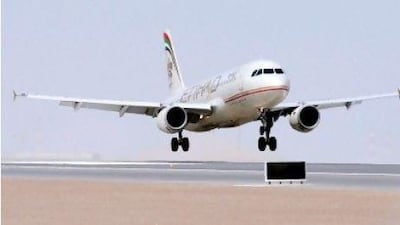Middle East airlines are likely to be hit by higher borrowing costs for aircraft purchases under new global rules that are likely to put an end to a controversy that has dogged the industry for more than a year.
The new rules, imposed by the Organisation for Economic Co-operation and Development (OECD), raise surcharges and could also increase interest rates on deals backed by export credit agencies in the US and Europe.
"The new rules will probably cause Middle East airlines to pay a few hundred million dollars extra within the next decade as a result of less favourable financing rates," said Angelique Watkins, a senior associate at the law firm Al Tamimi & Company.
The three biggest Gulf airlines, Emirates Airline, Etihad Airways and Qatar Airways, have more than US$100 billion (Dh367.3bn) worth of aircraft on order and scheduled for delivery over the next decade. They have traditionally relied on export credit-backed deals for between 14 and 24 per cent of their overall funding streams.
US and European airlines argued the previous rules put them at a competitive disadvantage because they were not able to access export-oriented funding assistance. Lufthansa recently said previous rules gave Gulf airlines an "unprecedented advantage".
Export credits are brokered by agencies such as the US Export-Import Bank, the UK Export Credit Guarantee Department and Coface of France. They lower the risks to lenders by guaranteeing loans to airlines for aircraft purchases, resulting in more attractive financing terms.
The enactment of the new rules should blunt the arguments of European carriers, such as Air France, who lobbied their governments to reject further access to Emirates because of advantages such as the use of export financing assistance.
Airlines with strong credit profiles, such as Emirates or Ryanair, could face an estimated 8 per cent rise in the cost of the debt raised to buy a plane, or about twice the current charge.
The new financing terms will bring export credit deals "closer to market conditions", the OECD said. These deals became especially important during the global downturn, when US and European governments were forced to increase loan guarantees to foreign airline customers as other forms of traditional financing dried up.
In 2009, the US Export-Import Bank arranged $2.3bn worth of deals to Middle East airlines, a 200 per cent increase from 2006. That year, Emirates was the bank's fourth-largest recipient overall, after Pemex, a Mexican oil and gas firm, Ryanair of Ireland, and "various government entities of India", the bank said.
Emirates and other Gulf airlines discounted the impact of the new rules on their business models, saying they had diversified funding sources.
"We do not see any problems in raising financing for our fleet expansion using the usual diverse range of options available," Emirates said.
Commentators have recently said the new rules would not seriously impair Emirates's growth.
"Judging from Emirates's reaction, this perk, like most of the others, appears to count for less than meets the eye," commented the trade magazine Aviation Week.
Etihad, meanwhile, joined Airbus recently in suggesting the real impacts would not be felt by well-funded Gulf airlines but by resource-poor Middle East airlines in countries such as Yemen and Egypt.
Details of the new rules include a set of minimum interest rates established and adjusted monthly, a maximum 12-year term for export credit support and a quarterly-adjusted market surcharge.
The rules are expected to be phased in over the next two to three years.
Last year, Emirates and Etihad were among 10 international carriers that formed a group called Aviation Alliance, which supported reforming the rules.
The higher costs come as Middle East carriers face a spike in fuel prices and fewer travellers to the region due to unrest in parts of the Mena region.
Meanwhile, Airbus said yesterday the Dubai leasing company DAE had cancelled orders for 30 aircraft.

